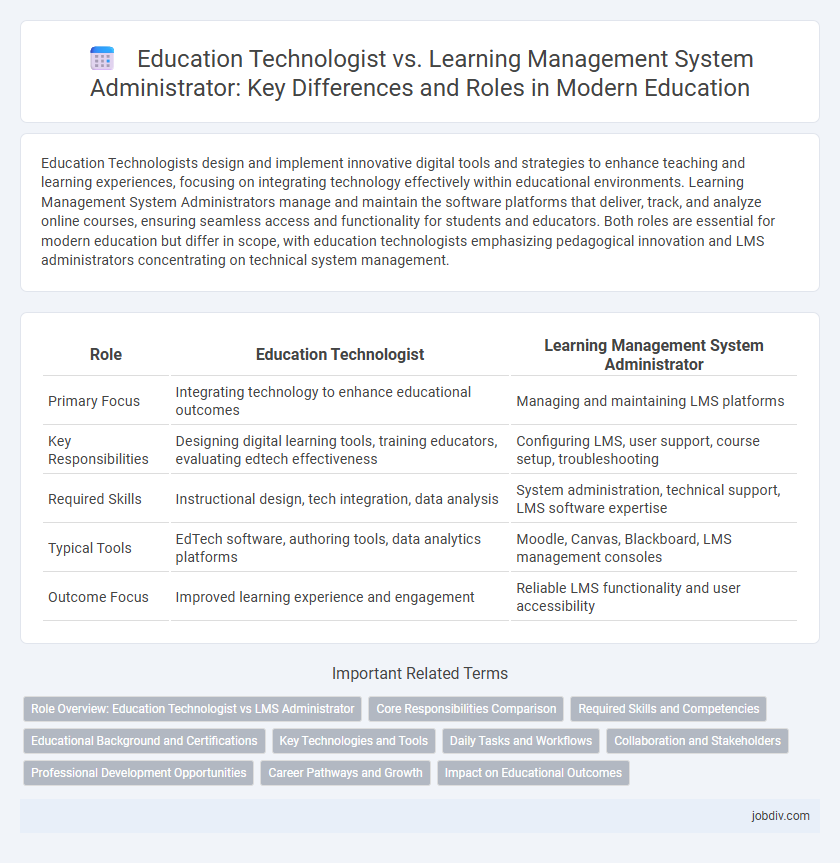Education Technologists design and implement innovative digital tools and strategies to enhance teaching and learning experiences, focusing on integrating technology effectively within educational environments. Learning Management System Administrators manage and maintain the software platforms that deliver, track, and analyze online courses, ensuring seamless access and functionality for students and educators. Both roles are essential for modern education but differ in scope, with education technologists emphasizing pedagogical innovation and LMS administrators concentrating on technical system management.
Table of Comparison
| Role | Education Technologist | Learning Management System Administrator |
|---|---|---|
| Primary Focus | Integrating technology to enhance educational outcomes | Managing and maintaining LMS platforms |
| Key Responsibilities | Designing digital learning tools, training educators, evaluating edtech effectiveness | Configuring LMS, user support, course setup, troubleshooting |
| Required Skills | Instructional design, tech integration, data analysis | System administration, technical support, LMS software expertise |
| Typical Tools | EdTech software, authoring tools, data analytics platforms | Moodle, Canvas, Blackboard, LMS management consoles |
| Outcome Focus | Improved learning experience and engagement | Reliable LMS functionality and user accessibility |
Role Overview: Education Technologist vs LMS Administrator
An Education Technologist specializes in integrating digital tools and innovative technologies to enhance teaching and learning processes, focusing on instructional design and technology strategy. A Learning Management System (LMS) Administrator manages the technical aspects of LMS platforms, ensuring system functionality, user support, and content management. While the Education Technologist drives educational innovation and technology implementation, the LMS Administrator oversees operational maintenance and user accessibility within the LMS environment.
Core Responsibilities Comparison
Education Technologists drive the integration of digital tools and innovative teaching strategies to enhance curriculum delivery, focusing on technology adoption and faculty training. Learning Management System (LMS) Administrators specialize in configuring, maintaining, and troubleshooting LMS platforms like Moodle or Blackboard to ensure seamless course management and user access. While Education Technologists emphasize pedagogical technology optimization, LMS Administrators concentrate on technical system support and user experience within online learning environments.
Required Skills and Competencies
Education Technologists require expertise in instructional design, educational software, and emerging technologies to enhance learning experiences, alongside strong analytical and project management skills. Learning Management System (LMS) Administrators must possess technical proficiency in platform configuration, user support, data analytics, and system troubleshooting to maintain and optimize LMS functionality. Both roles demand effective communication, problem-solving abilities, and a deep understanding of pedagogical principles to support educators and learners effectively.
Educational Background and Certifications
Education Technologists typically hold degrees in instructional design, educational technology, or related fields, often complemented by certifications such as Certified Professional in Learning and Performance (CPLP) or Google Certified Educator. Learning Management System Administrators usually have backgrounds in information technology, computer science, or educational technology, with certifications like CompTIA IT Fundamentals or vendor-specific LMS certifications (e.g., Moodle or Blackboard). Both roles benefit from continuous professional development to stay updated on evolving educational technologies and software platforms.
Key Technologies and Tools
Education Technologists specialize in integrating cutting-edge technologies like augmented reality, artificial intelligence, and adaptive learning platforms to enhance instructional design and learner engagement. Learning Management System (LMS) Administrators focus on managing and optimizing platforms such as Moodle, Blackboard, and Canvas, ensuring system functionality, user access, and data analytics for course delivery. Both roles leverage data visualization tools and user experience (UX) software, but Education Technologists emphasize innovation in pedagogy, while LMS Administrators prioritize system administration and technical support.
Daily Tasks and Workflows
An Education Technologist specializes in integrating instructional technology to enhance curriculum design, managing tools like virtual labs and interactive software, while collaborating closely with educators to optimize digital learning experiences. A Learning Management System (LMS) Administrator focuses on the daily operation of LMS platforms such as Moodle or Blackboard, handling user account management, course setup, and troubleshooting technical issues to ensure seamless access and functionality. Both roles require proficiency in educational technology, but the Education Technologist drives pedagogical innovation whereas the LMS Administrator maintains system stability and user support.
Collaboration and Stakeholders
Education technologists drive collaboration by integrating emerging technologies that align with pedagogical goals, fostering partnerships between faculty, IT staff, and instructional designers. Learning management system administrators maintain platform functionality and user support, ensuring seamless communication among students, instructors, and support teams. Both roles engage diverse stakeholders to enhance the educational environment through technology and operational expertise.
Professional Development Opportunities
Education Technologists advance their careers by mastering emerging instructional technologies, data analytics, and digital pedagogy, often engaging in specialized certifications and workshops to enhance their expertise. Learning Management System (LMS) Administrators focus on gaining proficiency in system administration, user support, and integration of educational software, frequently accessing vendor-specific training and certification programs for platforms like Canvas or Blackboard. Both roles benefit from continuous professional development through conferences, webinars, and collaboration with academic and technical teams to stay current with evolving educational technologies.
Career Pathways and Growth
Education Technologists design and implement innovative digital tools that enhance instructional methods, emphasizing technical expertise and pedagogical knowledge. Learning Management System Administrators focus on managing, configuring, and troubleshooting LMS platforms, ensuring seamless content delivery and user experience for educators and students. Career growth for Education Technologists often leads to roles in instructional design leadership or educational software development, while LMS Administrators may advance to IT management or systems architecture within educational institutions.
Impact on Educational Outcomes
Education Technologists drive improved educational outcomes by integrating innovative digital tools and instructional design strategies tailored to diverse learner needs. Learning Management System Administrators optimize platform functionality, ensuring seamless access and user experience that supports consistent curriculum delivery and real-time performance tracking. Both roles collaboratively enhance student engagement and achievement through technology-enabled learning environments.
Education Technologist vs Learning Management System Administrator Infographic

 jobdiv.com
jobdiv.com